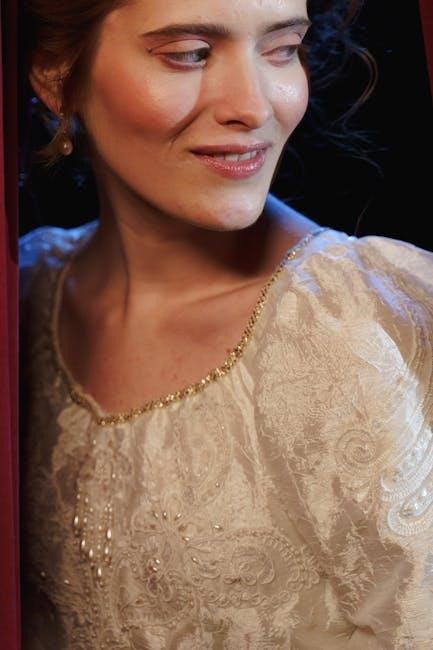Act 1 sets the tragic tone‚ introducing Verona’s feuding Montagues and Capulets․ The chorus foreshadows the inevitable fate‚ while servants’ conflicts escalate tensions‚ shaping the play’s dark foundation․
1․1․ The Opening Scene: Setting the Feud
The play opens with Sampson and Gregory‚ Capulet servants‚ discussing their hatred for the Montagues․ Their encounter with Abraham and Balthasar‚ Montague servants‚ escalates tensions․ Sampson’s provocative gesture of biting his thumb sparks a verbal confrontation․ Benvolio‚ a Montague‚ attempts to calm the situation‚ but Tybalt‚ a fiery Capulet‚ arrives‚ intensifying the conflict․ The brawl highlights the deep-seated animosity between the families‚ setting the stage for the tragic events․ This scene establishes the feud’s intensity and introduces key characters‚ showcasing how pride and hatred fuel the ongoing rivalry․
1․2․ The Chorus: Establishing the Tragic Tone
The chorus in Act 1 serves as a narrative voice‚ providing context and foreshadowing the play’s tragic outcome․ It introduces Verona’s feuding families and the ill-fated love between Romeo and Juliet․ The chorus’s poetic language sets a somber mood‚ emphasizing fate’s role in the lovers’ demise․ By framing the story‚ the chorus prepares the audience for the inevitable heartbreak‚ creating a sense of impending doom․ This narrative device bridges scenes and heightens emotional tension‚ ensuring the audience understands the broader implications of the characters’ actions․
The Montague and Capulet Families
The Montagues and Capulets are two powerful families in Verona‚ locked in an ancient feud․ Their bitter rivalry drives the play’s conflict‚ fueled by pride and loyalty․
2․1․ The Servants’ Conflict: Sampson and Gregory
Sampson and Gregory‚ servants of the Capulet household‚ initiate the conflict by provoking the Montagues․ Sampson bites his thumb‚ a disrespectful gesture‚ leading to a confrontation․ They encounter Abram and Balthasar‚ Montague servants‚ escalating tensions․ Benvolio‚ a Montague‚ attempts to intervene‚ but Tybalt‚ a hot-headed Capulet‚ refuses to back down․ The brawl reflects the deep-seated hatred between the families‚ setting the stage for further violence․ The clash underscores the explosive nature of the feud‚ drawing in Lord and Lady Capulet‚ who are concerned but ultimately powerless to stop it․
2․2․ The Fight Between Montagues and Capulets
The fight erupts in the streets of Verona‚ fueled by the servants’ animosity․ Sampson and Gregory confront Abram and Balthasar‚ leading to a heated exchange․ Benvolio attempts to mediate‚ but Tybalt’s aggressive stance escalates the situation․ The clash involves swords and shields‚ drawing in more participants․ Lord Capulet and Lord Montague arrive‚ adding their authority to the chaos․ The Prince of Verona intervenes‚ condemning the violence and warning both families to cease their feud․ The skirmish highlights the deep-rooted animosity and sets the stage for tragic events‚ as the families’ hatred becomes increasingly uncontrollable and destructive․

Key Characters Introduced in Act 1
Romeo‚ Juliet‚ Tybalt‚ and Lord and Lady Capulet are introduced‚ showcasing their roles in the feud and their personalities‚ which shape the play’s tragic trajectory․
3․1․ Romeo: The Young Montague
Romeo‚ a 16-year-old Montague‚ is portrayed as handsome‚ intelligent‚ and sensitive․ His initial infatuation with Rosaline highlights his romantic nature‚ while his impulsive decisions foreshadow his tragic fate․ Romeo’s emotional depth and poetic language showcase his vulnerability‚ making him a relatable and sympathetic character․ His introduction in Act 1 establishes him as a central figure in the escalating feud‚ setting the stage for his eventual encounter with Juliet and the chain of events that will define the play’s tragic course․
3․2․ Juliet: The Capulet Daughter
Juliet‚ the 13-year-old daughter of Lord and Lady Capulet‚ is introduced as a naive yet mature young woman․ Her first appearance showcases her innocence and curiosity about marriage‚ as she engages in a brief dialogue with her mother․ Juliet’s parents discuss her potential marriage to Paris‚ highlighting her limited agency in Verona’s patriarchal society․ Her initial thoughts on love and marriage reveal her youthful perspective‚ setting the stage for her transformative encounter with Romeo․ Juliet’s character is established as both vulnerable and resilient‚ hinting at the pivotal role she will play in the tragic events unfolding in Act 1․
3․3․ Tybalt: The Hotheaded Capulet
Tybalt‚ Juliet’s cousin‚ is introduced as a fiery and aggressive character‚ deeply invested in the Capulet-Montague feud․ A skilled swordsman‚ he is driven by hatred for the Montagues and seeks to defend family honor․ His volatile temperament escalates tensions‚ as seen when he confronts Romeo’s servants․ Tybalt’s entrance in Act 1 highlights his eagerness for conflict‚ and his suspicion of Romeo at the Capulet ball foreshadows future clashes․ His character embodies the destructive nature of the feud‚ making him a key antagonist in the unfolding tragedy․
3․4․ Lord and Lady Capulet: Juliet’s Parents
Lord and Lady Capulet are portrayed as authoritative figures‚ deeply rooted in Verona’s societal expectations․ Lord Capulet‚ a man of strong will‚ seeks to strengthen family ties through strategic alliances‚ such as Juliet’s proposed marriage to Paris․ Lady Capulet‚ equally assertive‚ supports her husband’s decisions‚ emphasizing obedience and duty․ Their interactions with Juliet reveal a strict‚ traditional mindset‚ prioritizing family honor over personal desires․ This rigid stance sets the stage for Juliet’s eventual defiance‚ highlighting the generational and cultural conflicts central to the play’s tragic progression․

Romeo’s Initial Infatuation
Romeo’s heart initially belongs to Rosaline‚ a woman he cannot be with‚ fueling his melancholy․ His infatuation highlights his emotional depth and sets the stage for his later passion for Juliet․
4․1․ Romeo’s Love for Rosaline
Romeo’s unrequited love for Rosaline dominates his emotions in Act 1․ He expresses deep sorrow and heartache‚ refusing to consider other women․ His friend Benvolio advises him to forget Rosaline and find another love․ Romeo’s infatuation is intense but abstract‚ as Rosaline is absent and unattainable․ This early love sets the stage for his later all-consuming passion for Juliet‚ showcasing Romeo’s romantic and impulsive nature․ His emotional turmoil reflects the theme of love’s complexity‚ highlighting how quickly and deeply he falls for someone‚ even when unreciprocated․
4․2․ Benvolio’s Advice to Romeo
Benvolio‚ Romeo’s cousin and close friend‚ offers wise counsel to alleviate Romeo’s heartache over Rosaline․ He advises Romeo to forget his unrequited love and explore other romantic possibilities․ Benvolio suggests attending the Capulet ball to broaden Romeo’s horizons‚ highlighting the idea that love can be found in unexpected places․ His advice reflects a practical and empathetic approach‚ aiming to distract Romeo from his sorrow․ Benvolio’s guidance ultimately leads Romeo to Juliet‚ setting the tragic events of the play in motion․ His words emphasize the theme of love’s unpredictability and the importance of moving beyond unattainable desires․

The Capulet Ball
Lord Capulet hosts a grand ball to enhance his family’s prestige and introduce Juliet to potential suitors․ The lively event features music‚ dancing‚ and celebration‚ setting the stage for Romeo’s daring attendance and his fateful encounter with Juliet․
5․1․ The Invitation to the Party
Lord Capulet sends invitations to prominent families in Verona‚ aiming to showcase Juliet’s eligibility for marriage․ The formal invitation highlights the grandeur of the event‚ emphasizing music‚ dancing‚ and feasting․ Guests are urged to attend‚ celebrating the Capulets’ social standing․ Paris‚ a potential suitor‚ is notably included․ The invitation reflects the family’s desire to strengthen alliances and secure Juliet’s future․ Servants are tasked with delivering the invitations‚ underscoring the hierarchical nature of Verona’s society․ This gathering sets the stage for Romeo’s unexpected arrival‚ fueled by Benvolio’s persuasion‚ leading to the fateful encounter between the two lovers․
5․2․ Romeo’s Decision to Attend
Romeo‚ initially hesitant due to his lingering feelings for Rosaline‚ decides to attend the Capulet ball after Benvolio persuades him․ Upon learning Rosaline will be present‚ Romeo’s curiosity and longing propel him to accept the invitation․ Masked to conceal his identity‚ he enters the Capulet estate‚ unaware of the transformative encounter awaiting him․ His decision‚ driven by a mix of heartache and intrigue‚ sets the stage for his fateful meeting with Juliet‚ igniting a passion that transcends the bitter feud between their families and forever alters their destinies․
Juliet’s Perspective in Act 1
Juliet‚ only 13‚ faces societal pressures and familial expectations․ Her parents discuss her readiness for marriage‚ highlighting her youth and naivety․ Her appearance at the window symbolizes her emerging consciousness and isolation amidst the familial feud․
6․1․ Juliet’s First Appearance
Juliet first appears in Act 1‚ Scene 3‚ as a naive 13-year-old․ Her mother and nurse discuss her readiness for marriage‚ highlighting her youth and societal expectations․ This introduction establishes Juliet’s innocence and the familial pressures she faces‚ setting the stage for her eventual defiance and growth․
6․2․ Juliet’s Thoughts on Marriage
In Act 1‚ Juliet expresses hesitation about marriage‚ reflecting her youth and naivety․ Her parents and the Nurse discuss her readiness‚ emphasizing societal expectations․ Juliet’s thoughts reveal her innocence and reluctance‚ as she struggles with the idea of being wed to someone she does not know․ This internal conflict highlights her growth from a obedient daughter to a self-determined individual‚ setting the stage for her eventual defiance and tragic fate․

The Role of the Chorus in Act 1
The chorus serves as a narrative guide‚ providing context and foreshadowing the tragic events․ Its poetic language sets the tone‚ preparing the audience for the impending doom․
7;1․ The Chorus as a Narrative Device
The chorus acts as an external narrator‚ offering insight into the play’s themes and character motivations․ Its commentary bridges scenes‚ providing context and emotional depth‚ while its poetic language enhances the tragic atmosphere‚ guiding the audience through the unfolding drama․
7․2․ The Chorus’s Foreshadowing of Events
The chorus in Act 1 foreshadows the tragic outcome‚ hinting at the inevitable sorrow that awaits the star-crossed lovers․ It sets the tone for the play‚ emphasizing fate’s role in their doomed love story․ The chorus bridges scenes‚ preparing the audience for the escalating conflict and the ultimate sacrifice of Romeo and Juliet․ Its poetic warnings create a sense of inevitability‚ guiding viewers to understand the fated course of events that will unfold․
